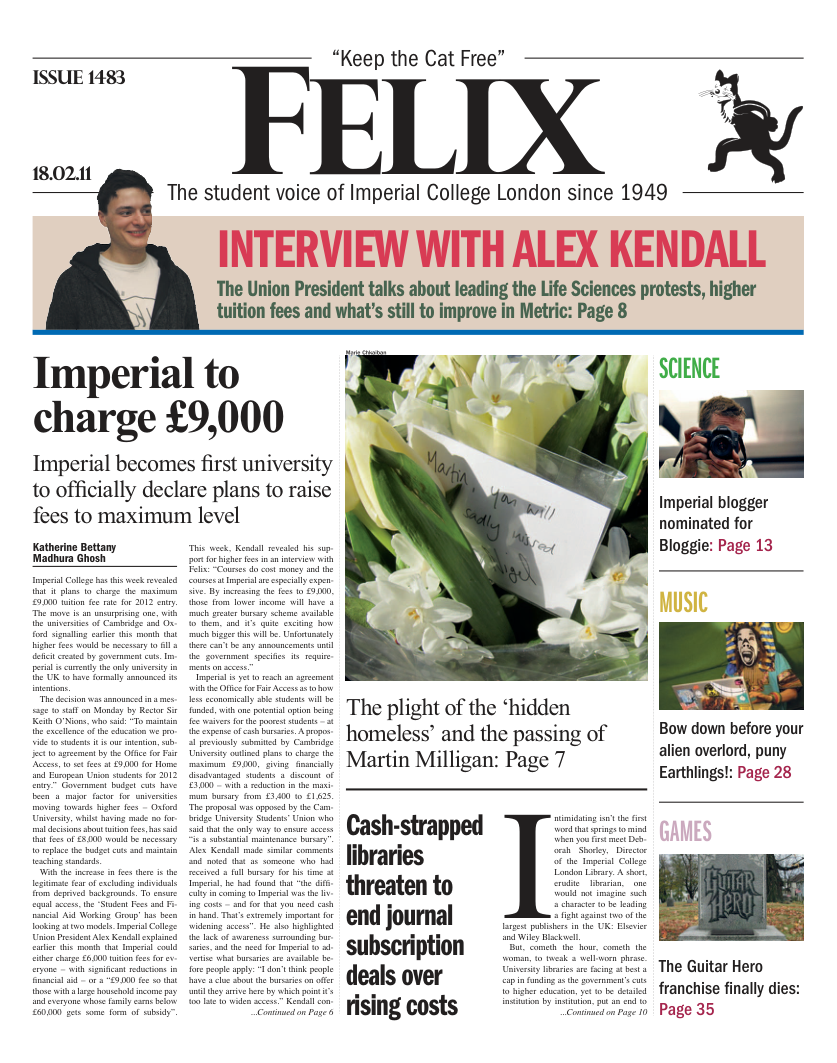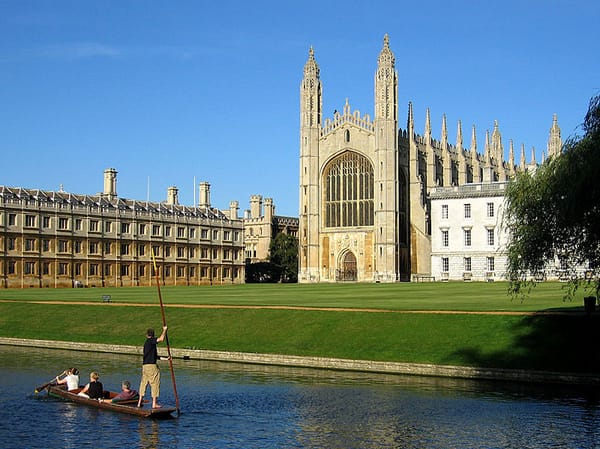Imperial to charge £9,000
Imperial becomes first university to officially declare plans to raise fees to maximum level

Imperial College has this week revealed that it plans to charge the maximum £9,000 tuition fee rate for 2012 entry. The move is an unsurprising one, with the universities of Cambridge and Oxford signalling earlier this month that higher fees would be necessary to fill a deficit created by government cuts. Imperial is currently the only university in the UK to have formally announced its intentions.
The decision was announced in a message to staff on Monday by Rector Sir Keith O’Nions, who said: “To maintain the excellence of the education we provide to students it is our intention, subject to agreement by the Office for Fair Access, to set fees at £9,000 for Home and European Union students for 2012 entry.” Government budget cuts have been a major factor for universities moving towards higher fees – Oxford University, whilst having made no formal decisions about tuition fees, has said that fees of £8,000 would be necessary to replace the budget cuts and maintain teaching standards.
With the increase in fees there is the legitimate fear of excluding individuals from deprived backgrounds. To ensure equal access, the ‘Student Fees and Financial Aid Working Group’ has been looking at two models. Imperial College Union President Alex Kendall explained earlier this month that Imperial could either charge £6,000 tuition fees for everyone – with significant reductions in financial aid – or a “£9,000 fee so that those with a large household income pay and everyone whose family earns below £60,000 gets some form of subsidy”. This week, Kendall revealed his support for higher fees in an interview with Felix: “Courses do cost money and the courses at Imperial are especially expensive. By increasing the fees to £9,000, those from lower income will have a much greater bursary scheme available to them, and it’s quite exciting how much bigger this will be. Unfortunately there can’t be any announcements until the government specifies its requirements on access.”
Imperial is yet to reach an agreement with the Office for Fair Access as to how less economically able students will be funded, with one potential option being fee waivers for the poorest students – at the expense of cash bursaries. A proposal previously submitted by Cambridge University outlined plans to charge the maximum £9,000, giving financially disadvantaged students a discount of £3,000 – with a reduction in the maximum bursary from £3,400 to £1,625. The proposal was opposed by the Cambridge University Students’ Union who said that the only way to ensure access “is a substantial maintenance bursary”. Alex Kendall made similar comments and noted that as someone who had received a full bursary for his time at Imperial, he had found that “the difficulty in coming to Imperial was the living costs – and for that you need cash in hand. That’s extremely important for widening access”. He also highlighted the lack of awareness surrounding bursaries, and the need for Imperial to advertise what bursaries are available before people apply: “I don’t think people have a clue about the bursaries on offer until they arrive here by which point it’s too late to widen access.” Kendall confirmed that the Union would be trying to survey the 27% of Imperial students who receive bursaries about “how they feel their bursary helps them, and also how they think it should be targeted in terms of a fee waiver or cash in hand.”
With tuition fees set to rise, the issue of access to financial aid such as bursaries becomes an ever more important one. Presently Imperial has a means tested fund of £4 million to distribute, of which £3.5 million is from tuition fees and £0.5 million is from the endowment. With cuts to government funding, Kendall cautioned, “the university may not be able to afford the £3.5 million give in bursaries unless [...] Imperial charges higher fees”. Earlier this month, Kendall spoke about the discussions within the working group about how bursaries will be allocated. It is Imperial’s fear that the government may demand ‘fee remission’, whereby students will not be able to use the money for living costs – a highly contentious issue for students living in London. Kendall continued, “For a London university, we know that living costs are the most expensive factor at university, and the current loan and grant only just covers this. Preventing [students] from using the bursary to top this up is a mistake”. O’Nions recognized that Imperial still has “a way to go in our considerations about what forms of financial aid would attract and support the most able, but needy, students” but highlighted that “for those who can manage Imperial’s courses, the College will work to ensure they can manage its costs.”
While the costs may be manageable, many may be unwilling to take on such large debts before they are economically independent. With the crushing toll of the recession, both the financially deprived and the squeezed middle class are more aware than ever of the result such large debts will have on their lives. Concerns that world class education will only be available to the very richest are still very much present. Whilst Imperial has an academically elitist image, many are concerned that this elitism might extend into the cross-section of society Imperial attracts. O’Nions highlighted that the college has “plans for a long-term campaign for philanthropic support [...] to attract the brightest and the best in the world for generations to come.” Nonetheless, whether these plans will yield their intended results is another matter; anxiety is still expressed by numerous students despite the many reassurances of financial aid. With questions surrounding the diversity of the student population already arising, how Imperial will ensure that students from poorer backgrounds continue to apply remains an unclear but important issue.








